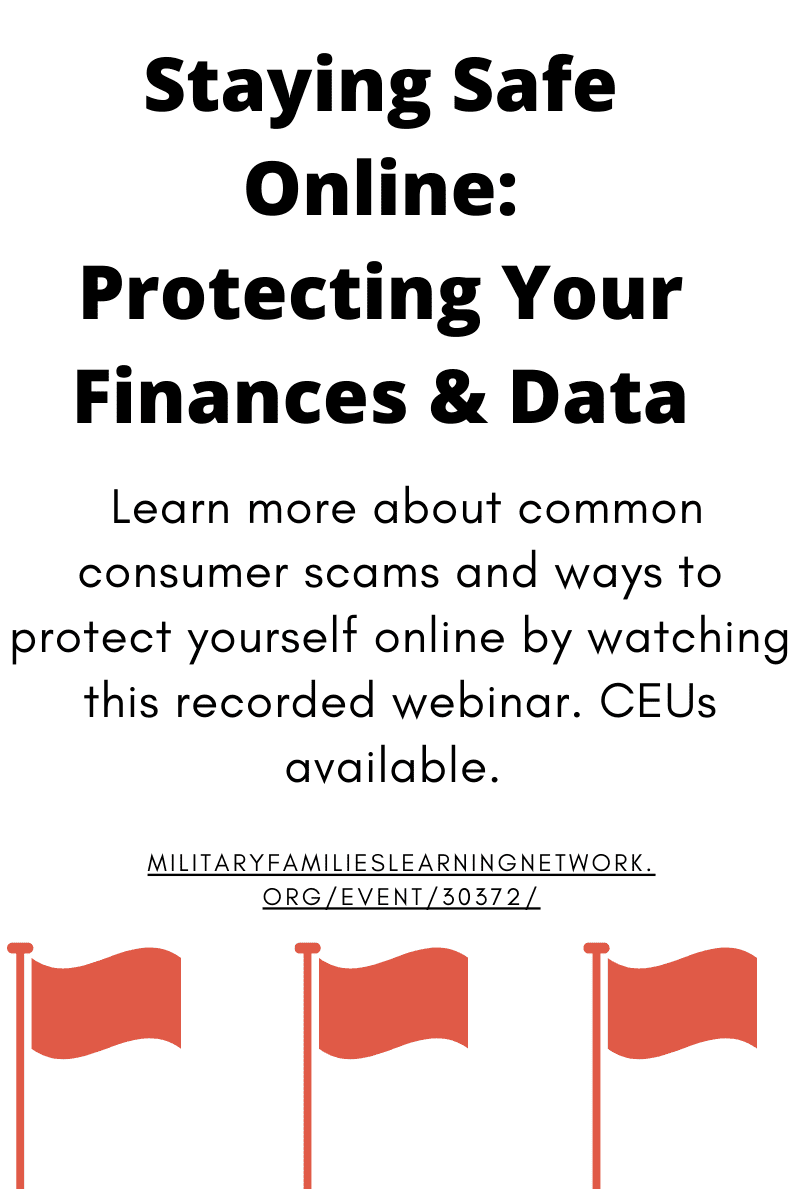By Laura Royer
Whenever a financial crisis hits, especially a global one, it sets up great opportunities for scam artists to prey on the timely situation. Therefore, it is important that Personal Finance Managers (PFMs) working with military families or service members encourage them to be mindful of who they are communicating with at all times and take extra precautions to recognize signs of a creditor scam.
The scams usually consist of a caller trying to collect on a debt that the borrower doesn’t owe or someone seeking to recover on a debt, but the original creditor did not authorize the caller to collect the debt for them. So how can someone identify a real scam?
Be Aware of the Red Flags
If a creditor does any of the following, proceed with caution:
- tries to collect payment on a debt the borrower does not recognize or believe they owe;
- will not provide the borrower with a name, address, or validation of the debt;
- uses scare tactics or threats to get the borrower to pay now (i.e., threatens jail time, to tell family or friends, or an employer, etc.); or
- asks the borrower for highly sensitive information.
While a legitimate creditor may still practice some of these tactics, the borrower should take extra precautions when any of these practices are presented to them.

Ask the Creditor to Confirm the Information
If a borrower receives a call from a debt collector or creditor, they should immediately verify that they are speaking with a legitimate agency that is authorized to collect payment for a debt owed. One way to verify the legitimacy of the credit is for the borrower to call the company back directly with the best number he or she already has for the creditor.
The other way is to ask the creditor to verify or confirm the debt by mailing paperwork to prove that the creditor actually has all of the records of the debt. The borrower should ask the creditor to confirm their name, company, street address, and telephone number in addition to sending the validation notice. The notice must include the amount of the debt, the name of the creditor owed, and the borrower’s rights under the federal Fair Debt Collection Practices Act.
If the creditor refuses to provide the information, the borrower should end the call. It is advised to never pay a creditor by phone until the borrower has something in writing to confirm the debt and payment arrangement that was agreed upon.
Tips to Prevent Being Scammed
- Ask for information: Ask the creditor for a callback number, address, name of the company, and other pertinent information so that the borrower can research to verify the creditor.
- Contact the original creditor: If the borrower is suspicious about the call, they should contact the original creditor to confirm that the agency is either working on the creditor’s behalf or selling the debt to that company.
- End the call: If a borrower is concerned about the creditor call being a scam, they should end the call immediately. If the borrower has an address for the creditor, he or she should mail a letter requesting the creditor to stop calling. Legitimate debt collector knows that, by law, they must stop calling if asked.
- Do not provide personal or financial information: Unless the borrower is confident that he or she is speaking with a real creditor, it is advised to not share information like a bank account, credit card, or Social Security information. A scam artist may be requesting this information in order to “phish” the borrower’s information to commit identity theft.
- Check credit reports: The borrower should request his or her credit reports to verify that the debt is being reported and the company that owns or has the right to collect the debt. He or she can also verify the amount owed. It’s important to note that not all creditors provide information to the credit reporting agencies. If the debt is not there, it doesn’t necessarily invalidate that the debt exists. Everyone is entitled to receive a free credit report annually for free. To receive the free credit report, the borrower should go to AnnualCreditReport.com or call (877) 322-8228.
- Be sure to report the call: If a borrower believes he or she spoke with a scammer, they should report the call to their creditor, the Federal Trade Commission, and their state Attorney General’s office. The only way to stop the scammer is to report that it is happening.
For more information about the Fair Debt Collection Practice Act, go to https://www.consumerfinance.gov/ask-cfpb/what-is-an-unfair-practice-by-a-debt-collector-en-1401/
Photo by Andrea Piacquadio/Pexels















